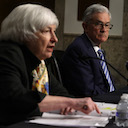
The response to COVID-19 proved that the federal government is far more capable of managing the economy than many people thought. What happens now that Bidenomics faces rising headwinds?

MMT’s account of the origin of money is a useful corrective to the stories told by orthodox economists. But a deeper history of the social construction of money opens up more radical possibilities for rethinking the monetary order.

We must recognize and compensate for the intrinsic political weaknesses of taxation—and specifically progressive taxation—through the alternative fiscal strategy of economic democracy.

Rather than bypassing the problem of power by putting our faith in MMT’s printing press, we need a strategy to rebuild the tax state and move toward economic democracy.

A long line of critical fiscal theorists has pointed to the limits of financing a politics of emancipation through levies on a regressive economy. We need to heed their warnings today.

The rules of the monetary system are too important to be left to financial elites. When ordinary people speak up, they often come up with better ideas.

At each step, poor implementation has weakened the U.S. recovery effort.

The author of The Deficit Myth on why national debt is not an obstacle to progress—and why the government can afford to fund its priorities.

As the 2008 financial crisis made clear, without major change at the European level, social democratic responses to the coronavirus crisis will be out of reach for many countries across the continent.














